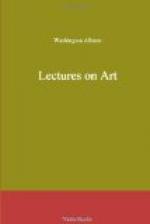The universality of a Principle does not imply everywhere equal energy or activity, or even the same mode of manifestation, any more than do the essential Faculties of the Understanding. Of this we have an analogous illustration in the faculty of Memory; which is almost indefinitely differenced in different men, both in degree and mode. In some, its greatest power is shown in the retention of thoughts, but not of words, that is, not of the original words in which they were presented. Others possess it in a very remarkable degree as to forms, places, &c., and but imperfectly for other things; others, again, never forget names, dates, or figures, yet cannot repeat a conversation the day after it took place; while some few have the doubtful happiness of forgetting nothing. We might go on with a long list of the various modes and degrees in which this faculty, so essential to the human being, is everywhere manifested. But this is sufficient for our purpose. In like manner is the Principle of Harmony manifested; in one person as it relates to Form, in another to Sound; so, too, may it vary as to the degrees of truth and goodness. We say degrees; for we may well doubt whether, even in the faculty of memory, its apparent absence as to any one essential object is any thing more than a feeble degree of activity: and the doubt is strengthened by the fact, that in many seemingly hopeless cases it has been actually, as it were, brought into birth. And we are still indisposed to admit its entire absence in any one particular for which it was bestowed on man. An imperfect developement, especially as relating to the intellectual and moral, we know to depend, in no slight measure, on the will of the subject. Nay, (with the exception of idiots,) it may safely be affirmed, that no individual ever existed who could not perceive the difference between what is true and false, and right and wrong. We here, of course, except those who have so ingeniously unmade themselves, in order to reconstruct their “humanity” after a better fashion. As to the “why” of these differences, we know nothing; it is one of those unfathomable mysteries which to the finite mind must ever be hidden.
Though it has been our purpose, throughout this discourse, to direct our inquiries mainly to the essential Elements of the subject, it may not be amiss here to take a brief notice of their collateral product in those mixed modes from which we derive so large a portion of our mental gratification: we allude to the various combinations of the several Ideas, which have just been examined, with each other as well as with their opposites. To this prolific source may be traced much of that many-colored interest which we take in their various forms as presented by the imagination,—in every thing, indeed, which is true, or even partially true, to the great Principle of Harmony, both in nature and in art. It is to these mixed modes more especially,




